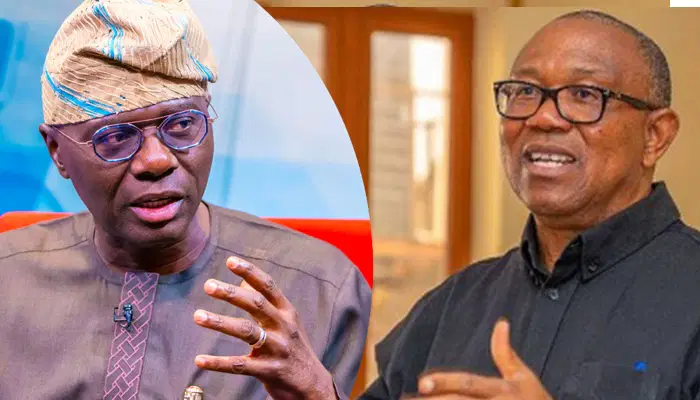Opinion: Criticizing Sanwo-Olu’s attack on Peter Obi

Lagos State Governor, Babajide Sanwo-Olu (left), Labour Party 2023 Presidential candidate, Peter Obi (right). Photo Credit- Vanguard
Lagos State Governor Babajide Sanwo-Olu criticized Peter Obi for “demarketing” Nigeria during a Johns Hopkins University speech on April 24, calling him a hypocrite for critiquing the country’s high rate of poverty and claiming that his Anambra governorship was complicit, as reported in the Vanguard. Sanwo-Olu’s outburst, while defending Nigeria’s image, wrongly silences public opinion, that aims to expose government failures, and undermines democratic critique, ignoring Obi’s intent to address the foundational issues facing Nigeria.
Peter Obi’s Johns Hopkins speech highlighted Nigeria’s poverty and systemic failures, like the 70% poverty rate (CIA World Factbook) and 40.6% unemployment (National Bureau of Statistics), urging global attention. Sanwo-Olu called this “disparaging,” ignoring Obi’s prudent Anambra record with a N75 billion surplus, framing his critique as hypocrisy while dodging the real issue of Nigeria’s suffering.
Sanwo-Olu’s attacks overlooks Lagos’ economic inequalities; Makoko’s shanties near Victoria Island’s abundance and his 2025 budget prioritizing public lighting over schools, are just the reflection of the Nigerian government’s misplaced priorities that Obi critiques. Facing controversies like the 2020 Lekki Toll Gate massacre, Sanwo-Olu scapegoats Obi, deflecting from his own failures instead of addressing citizens’ demands. Imagine a kettle calling a pot black.
RELATED STORIES
Child labour: A persistent issue in Nigerian democracy
Is Tinubu’s reelection more important than Nigeria’s economy?
Defection season: Who do Nigerian politicians really serve?
In addition, Sanwo-Olu’s attack stifles Obi’s right to hold public opinion and freedom of speech, protected by Nigeria’s Constitution, labeling it “disturbing behavior” despite Obi’s consistent accountability push. This mirrors government suppression, like the arrests of Nubari Saatah, undermining democratic and civic rights and reflecting the similar and usual pattern of dodging the test on accountability.
Now, I know that many may grow some sentiment to Sanwo-Olu’s criticism and may argue Obi’s critique harms the global reputation and image of Nigeria, preventing foreign investment amid a naira that stands st N1,532.94 against a dollar. But foreign investors only hate to do business in a place where corruption and economic instability persit, which Obi had highlighted in his speech and not where public criticism is silenced, especially with Lagos’ infrastructure woes like Lekki flooding costing billions of naira annually or the countless number of cult clashes in Oshodi, which Sanwo-Olu should aim to resolve instead of targeting critics.
Final take
Sanwo-Olu’s attack on Obi misses a chance for introspection and reflection. Obi’s critique was a patriotic call for improvement, just like what any true Nigerian would want to do and not betrayal, and Sanwo-Olu should address Lagos’ issues like poverty, poor infrastructure, and lack of transparency; instead of suppressing public opinion, which aims to show how democracy can survive in Nigeria. As Nigerians needs solutions, not repression, to thrive democratically.

